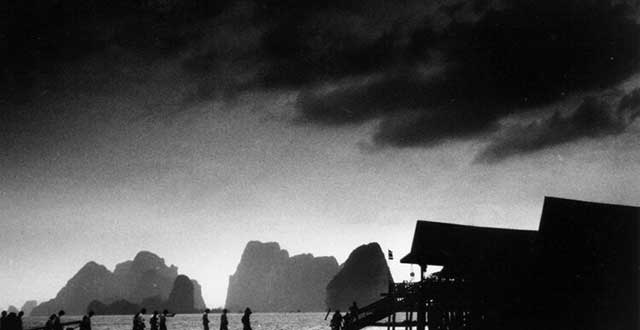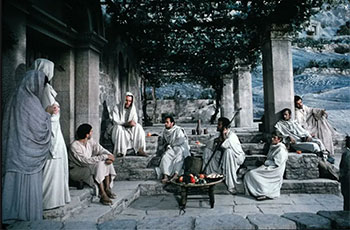
NOTES ON FILM & RESTORATION
10/08/2021Tom Quinn, the founder and head of Neon, is taking a bold and necessary step forward in the name of cinema. Neon will be releasing Apichatpong Weerasethakul’s Memoria as a “road show”—going one theatre in one city at a time across the country…and that’s it. No Blu-ray, no DVD, and most importantly of all: no streaming. No, Memoria will not be sharing a “swimlane” with (imagine algorhythmically generated “similar” films here). You will have to see it in a theatre, or miss it.
Will the film eventually turn up on some other platform? Possibly. But the gesture is very important.
In his resplendent Charles Eliot Norton lectures on the “crisis” of music in the 20th century, Leonard Bernstein posed the rhetorical question: does this focus on music and its development actually matter? Is it relevant? “The world totters,” said Bernstein, “governments crumble, and we are poring over musical phonology and syntax. Isn’t it a flagrant case of elitism? Well, in a way it is. Certainly not elitism of class—economic, social or ethnic—but of curiosity, that special inquiring quality of the intelligence. And it was ever thus. But these days, the search for meaning through beauty and visa-versa becomes even more important, as each day mediocrity and art-mongering increasingly uglify our lives. And the day when this search for John Keats’ truth/beauty ideal become irrelevant, then we can all shut up and go back to our caves. Meanwhile, to use that unfortunate word again, it is thoroughly relevant.”
These lectures were delivered almost 50 years ago. They could have been written yesterday.
We have arrived at a strange moment. The terms “elitism” and “elites” have been rendered so elastic as to become all but meaningless, and the same could be said of “friend,” “community,” “freedom” and “democratic.” And, of course, “social.” Market-driven logic is sold, relentlessly, as “reality.” And in the process, art is treated as a doormat, a tabula rasa on which one can project any half-baked “idea” or program. And the artists? Or the people who give themselves to art? Who pronounce the word cinema without shame, but with real pride? I can say from personal experience that the labels come fast and furious at the mere mention of the word. My own favorite was “effete,” a word that good old Spiro Agnew used to flog from the podium.
The reality of the market is not reality, period: there is an infinity of dimensions to being alive, and art is a precious reminder of just that. It is the polar antithesis of commerce, and it addresses us not as a consumer but as a fellow human being. That goes for every single title that’s been restored and preserved by The Film Foundation since its inception, including the 2000 title Mysterious Object at Noon, the first feature from Apichatpong Weerasethakul, known to many as Joe.
It’s wonderful that so much is available now, to see at home. The trade-off is that it is offered to us in the basest possible manner, determined by a bottom-line, lowest-common-denominator approach to programming, equalizing absolutely every moving image under the sun, and all but encouraging the consumer to bail the minute they get bored or distracted or confused or challenged or anything but lulled by more of the same. Again.
Films should be widely available. They should also be valued. That was why John Cassavetes made it so difficult to see his films when he was alive, and that is the point of Joe and Tom’s grand gesture.
- Kent Jones
Follow us on Instagram, and Twitter!
MYSTERIOUS OBJECT AT NOON (Thailand, 2000. d. Apichatpong Weerasethaku)
Restored in 2013 by the Austrian Film Museum and Cineteca di Bologna/L’Immagine Ritrovata laboratory, in association with The Film Foundation’s World Cinema Project, LISTO laboratory in Vienna, Technicolor Ltd in Bangkok, and Apichatpong Weerasethakul. Restoration funded by Doha Film Institute.
